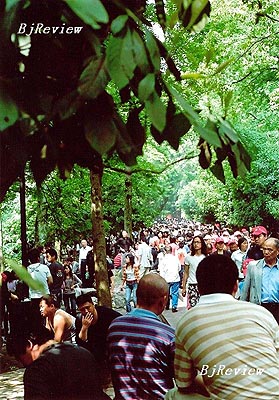|

Like a modern version of the Klondike and California goldrush days, the lure of "Golden Week" holiday travel during the Spring Festival, May Day and October's National Day in China is irresistible to millions of adventure-starved people, Chinese and foreigners alike. From the very beginning, this "quest for gold" involves a seemingly inexhaustible stream of human bodies straining the capacity of a multifaceted transportation network to its limits.
According to official statistics, during the 2007 May Day holiday an estimated 150 million travelers spent approximately 320 billion yuan (about $43 billion), unquestionably a truly golden week for the Chinese economy.
The first time I traveled in China by train during the Spring Festival provided for a totally unexpected experience. Upon our arrival at the train station, first impressions seemed perfectly normal, with only a few people around waiting. Suddenly the door from the waiting hall above us were flung open to release what appeared to be an endless cascade of human bodies rushing down toward us threatening everything in their way at the exact time the train approached.
Even before the train had come to a stop, the massive onslaught of bodies engulfed us from all sides, mercilessly pushing and shoving, screaming and trying to scale windows like a steep mountainside, with an assortment of baggage flying about like errant projectiles.
Once on the train, totally exhausted from the "struggle for survival," I had to alternate standing on one leg at a time like a red crowned crane in the narrow hallway, with everyone around me being packed like sardines.
I am quite certain that comparable scenes are unlikely to occur when boarding one of China's ultramodern trains, like the world's highest altitude train (4,000 meters above) that travels from Qinghai to Lhasa, but our train apparently occupied a low rank within the Chinese railway system, optimally designed for mass transportation, a function it served extremely well.
Air travel in China during a "Golden Week" is marginally more comfortable but the number of air passengers, especially Chinese, on the major routes to the most frequented tourist destinations, is steadily increasing, often leading to deteriorating conditions at airport as well as onboard overcrowding.
A situation during air travel that I really dislike often occurs when passengers are taken by bus to the plane parked on the tarmac and must board via the portable staircase. Many Chinese people do not like to queue and set off in a mad rush, pushing furiously to board the plane for no apparent reason, as they have reserved seats marked on their boarding passes.
Interestingly enough, the first time I traveled by plane in China was during the Spring Festival "Golden Week" in 2003. I clearly remember that the flights between major points of destination as well as short distance connecting flights, were half empty, and I was the only foreigner on board. Now the planes are filled to capacity, with a majority of Chinese, reflecting the improved living standards over the past four years as a result of economic development the country is experiencing.
At the points of destination the constantly self-regenerating chains of human bodies move mostly non-stop in an ever-quickening pace and an apparent state of communal hysteria. Various organized tourists groups are constantly bombarded with ear-deafening, multidirectional megaphone announcements and converge on each other like herds of sheep, while following their tour leader holding high a brightly colored, triangular-shaped flag like a magic wand.
In their relentless "Quest for Gold," the pilgrims dutifully amble along new pathways of discovery in a kind of mechanical rhythm of movement. And this is my dilemma! I feel extremely uncomfortable being immersed in large crowds and have a very low sociophobic threshold.
Perhaps I also have outdated ideas about travel in that I need personal space, prefer to travel in style and comfort, relax and take it easy.
Most Chinese as well as foreigners don't seem to mind the existing travel milieu or perhaps have resolved to accept it in a rational way as a fait d'accompli, with their overriding concern being to enjoy the change from everyday routines and duties and to appreciate the chance and privilege to explore new vistas in their lives.
But what chance is there for me to travel in China in an all-pervasive atmosphere of mass tourism? Perhaps it is an illusion, but my next travel will be by plane to west China, going hiking and camping in the wide-open plains of Xinjiang Uygur Autonomous Region and Qinghai Province, hoping to find some solitude in the kingdom of the Tibetan antelope.
The author is a Canadian teaching in Shandong | 